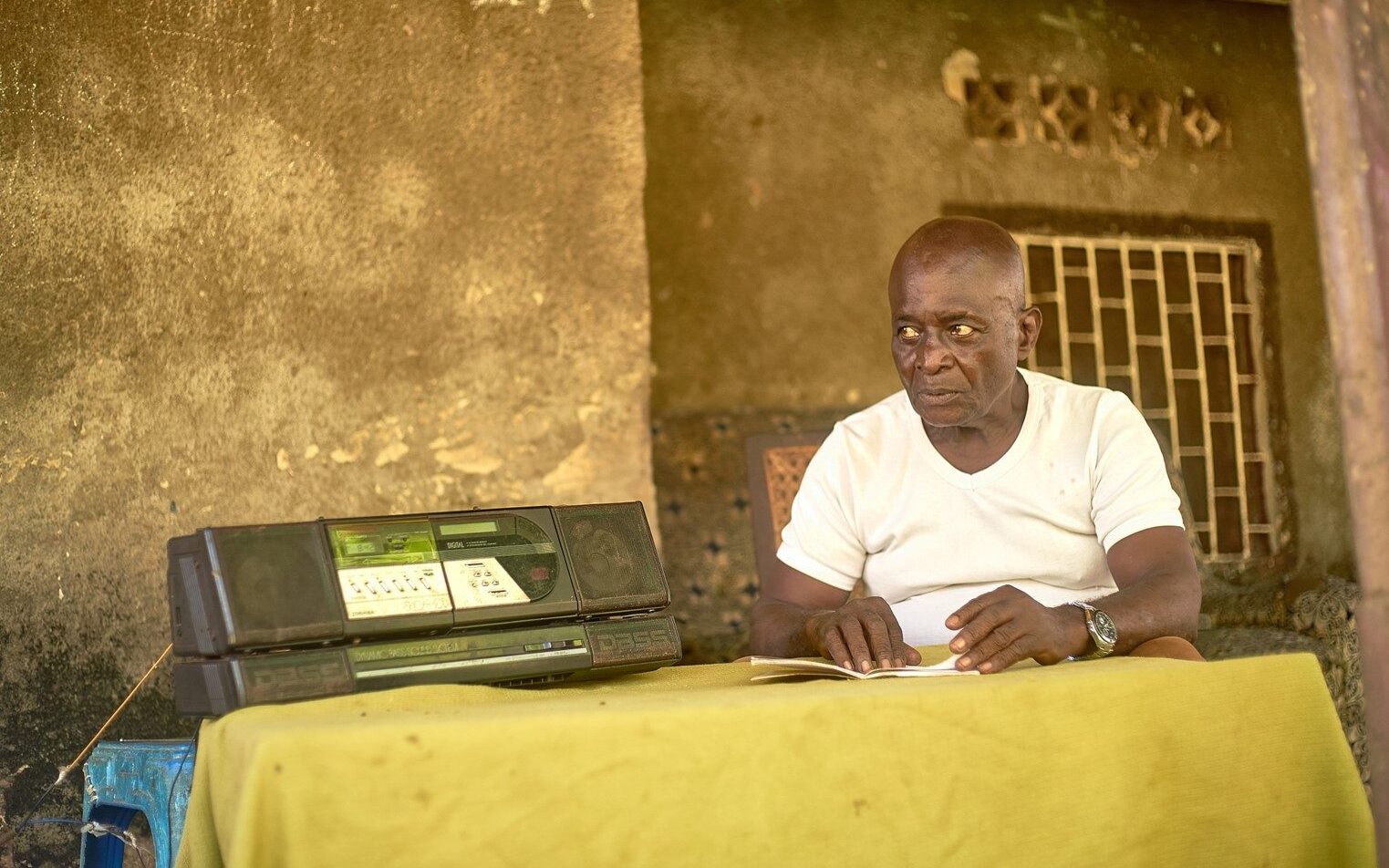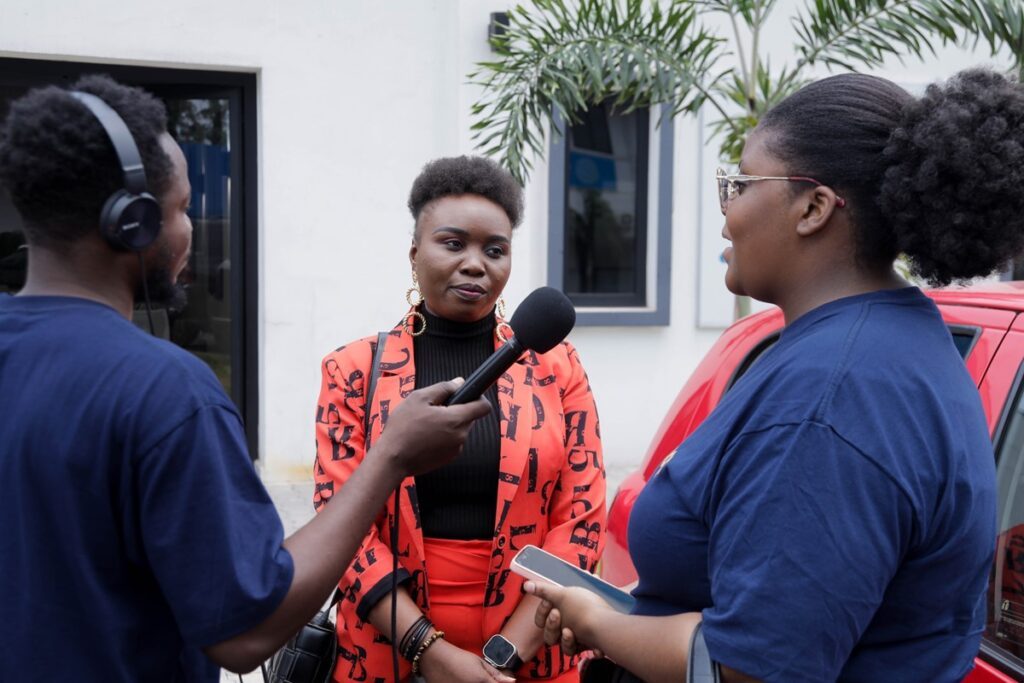EBO-SURSY Radio betters community’s relationship with veterinarians

On the African continent, radio is still deeply intertwined with community life, reflecting the realities of society and their health concerns. It also remains the most dependable way to deliver messages important to the public, especially in difficult to reach areas. After the resounding success of the first phase of EBO-SURSY Radio (funded by the European Union), the World Organisation for Animal Health (WOAH) committed itself further to the prevention of animal disease outbreaks through educational radio programmes.
Focusing on the Democratic Republic of the Congo (DRC), a country participating in the EBO-SURSY Project, we partnered with Radio Workshop to target those living in forested regions at the animal-human interface, and those likely to eat bushmeat in urban areas. Radio Workshop trained over 30 journalists and youth reporters on zoonotic diseases and how interactions with wildlife can impact human health. With five radio stations in three provinces, the radio partners broadcasted over 2400 messages during four months, conducted over 80 shows, and hosted 12 outreach activities.

EBO-SURSY Radio proved to be an extremely popular programme with over 2.5 million listeners. It was more popular in rural areas like Mbandaka and Kisangani than in the nation’s capital. In a sample of 601 people interviewed as a part of an evaluation survey, 42% of respondents in Mbandaka and 39% of those in Kisangani indicated they listened to the EBO-SURSY Radio programme, compared to 22% in Kinshasa.
A positive finding was that:
of those indicating they listened to EBO-SURSY Radio were regular listeners and followed the programme several times a week.
of listeners made it a family affair, increasing exposure to critical health lessons to children and the youth.
This demonstrates that radio can provide a special benefit to isolated communities.
Given the importance of this programme, I had to take the decision to buy a larger radio so that my whole family could be educated about zoonoses and learn about the protective measures that need to be put in place to protect ourselves and our environment.
Listener in Yangambi, Democratic Republic of the Congo
Creating capacity for health journalism at the local level
In addition to the benefits of educating families on zoonotic diseases, EBO-SURSY Radio built the capacity of journalists to respond to the health needs of their communities when facing disease outbreaks. The popular Kinshasa radio RTG@ shared that, “EBO-SURSY Radio increased our credibility. With the Monkeypox outbreak, people [said] I heard RTGA talking about it…I’m proud to have been one of the first radio stations in DRC to start raising awareness on this.”
Capitalising on the engagement of radio broadcasters and reporters with EBO-SURSY Radio, the project also created a nation-wide radio competition. Many reporters and broadcasters across the DRC competed for best reportage and for best broadcast, centred on the themes such as One Health, zoonosis, and wildlife surveillance. The judges, each representing one part of One Health, awarded the two winners in a ceremony that included the presence of the Ministry of Livestock. These broadcasts and reportages have the opportunity of being re-aired, ensuring that people all over the nation are exposed to more information on animal health.

When citizens have the knowledge and confidence to ask more about animal health, it changes the way people consider the interconnection between animals, the environment, and their society. It raises awareness on how people can keep themselves and the wildlife in their community safe, even in remote areas. This is key in places that do not have the reflex to consult animal health experts at all.
Improving community relations with local veterinarians
A primary goal of the World Organisation for Animal Health’s radio programming has been to reinforce the relationship between citizens and their local veterinarians. In the evaluation survey, the results revealed that only 19% of surveyed households in the target communities had consulted a veterinarian in the past six months. Consulting a veterinarian was rarer in the project’s rural villages (7.5%) and in Mbandaka (9%) than in major cities. Rural communities have yet to develop the habit of consulting veterinarians because it is simply hard to find one: the most common reason households who wanted to consult a veterinarian, but did not, was because no veterinarian was present in the community (32%). Even in urban areas however, finding a veterinarian is not easy:
Imagine the [official] slaughterhouse [of a] city, [they] only slaughter three cows a day. That means there is a huge amount of clandestine slaughter… There are slaughter spots in other towns but there is no veterinary control there.
Veterinarian in Democratic Republic of the Congo
Another reason veterinarians were not valued among the surveyed participants was because of a lack of awareness. For 30% of households, they did not see the usefulness of veterinarians, and for 28% of them, expensive fees ensured consulting veterinarians remained out of reach.
Despite these various challenges, EBO-SURSY Radio created a demand for veterinarians in communities where they broadcasted. The results indicated that 42% of those who had consulted veterinarians did not have the habit of doing so before the campaign. Overall, 37% of the total listeners of the programme consulted a veterinarian, in comparison to 11% of non-listeners.
Listeners also emphasised the importance of having creating access to the veterinarians and to the products and solutions they learned about from the EBO-SURSY Radio programme, including vaccination, treatment of sick animals, meat inspection, and general consultations.
Such findings have given insight on how future radio programmes by the World Organisation for Animal Health’s can be focused for the community’s benefits. The more people are aware of how vital veterinarians are for the protection of animal health, as well as for the health of people and the ecosystems around them, the more they will advocate for such services.
Because animal health is our health.
It is everyone’s health.
More information
-
Wildlife Health
-
EBO-SURSY Project page
-
Video: Wildlife health is everyone’s health
